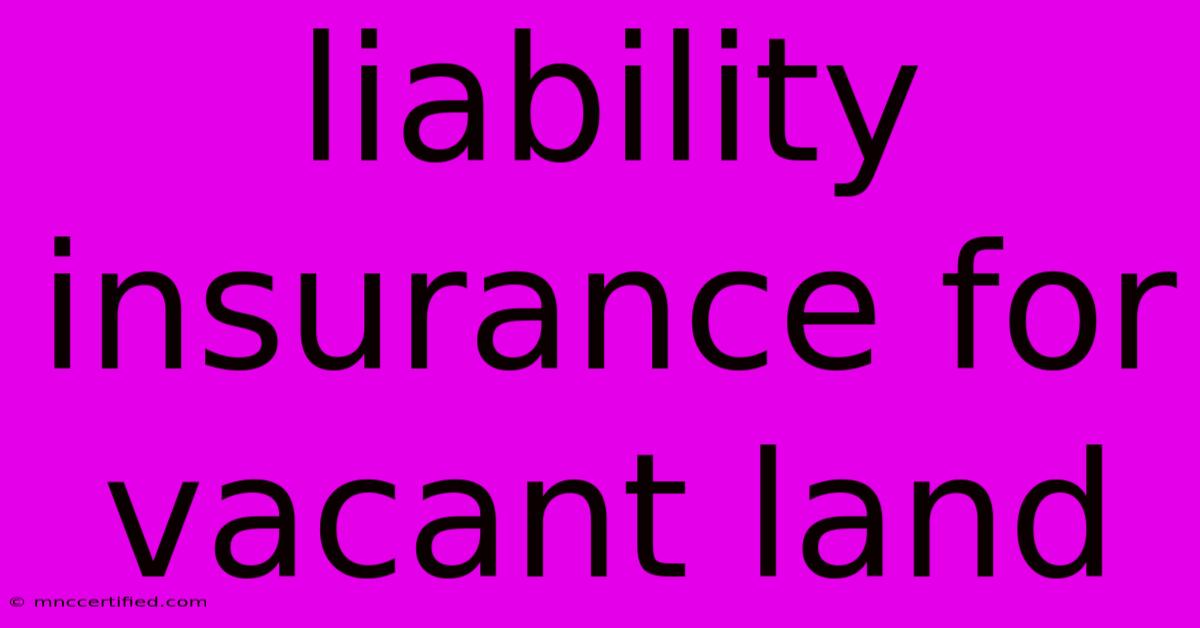Liability Insurance For Vacant Land

Table of Contents
Protecting Your Investment: Understanding Liability Insurance for Vacant Land
Owning vacant land can be a smart investment, but it also comes with potential risks. While you might not be actively using the land, it can still be a source of liability. This is where vacant land liability insurance comes in, providing crucial protection against unforeseen events and financial burdens.
Why Do You Need Liability Insurance for Vacant Land?
You might think that empty land poses no risk, but there are various scenarios where liability could arise:
- Trespassers: People might enter your property without permission, leading to injury or property damage.
- Attractive Nuisances: Objects like abandoned buildings, pools, or equipment can attract children, increasing the likelihood of accidents.
- Environmental Issues: If your land contains hazardous materials or experiences pollution, you could face legal claims.
- Natural Disasters: Floods, fires, or storms can occur on your property, causing damage to neighboring properties or public infrastructure.
Without liability insurance, you could be personally responsible for covering legal costs, settlements, and damages related to these incidents, potentially leading to significant financial losses.
Key Coverage Features of Vacant Land Liability Insurance
Vacant land liability insurance typically includes several essential coverages:
- Bodily Injury Liability: Protects you from financial responsibility if someone is injured on your property.
- Property Damage Liability: Covers the costs of damages to someone else's property caused by you or an incident on your land.
- Medical Payments: Provides coverage for medical expenses incurred by someone injured on your property, regardless of fault.
- Legal Defense Costs: Pays for legal fees associated with defending against lawsuits related to accidents or incidents on your land.
Optional Coverages: Some policies offer additional protection, including:
- Environmental Coverage: Addresses liability related to environmental damage or contamination.
- Pollution Liability: Covers costs associated with cleanup and remediation of pollution incidents.
- Personal Injury Coverage: Protects you from claims of slander, libel, or wrongful eviction.
How to Choose the Right Vacant Land Liability Insurance
To find the most suitable insurance policy, consider the following factors:
- Property Location: Factors like proximity to urban areas, hazardous materials, and natural disaster zones can influence coverage needs.
- Land Usage: The intended use of the land, such as future development or passive investment, may affect coverage requirements.
- Risk Assessment: Conduct a thorough assessment to identify potential hazards and risks associated with the property.
- Policy Limits: Choose adequate liability limits to protect yourself from significant financial losses.
Benefits of Vacant Land Liability Insurance
Investing in vacant land liability insurance offers numerous benefits:
- Financial Protection: It shields you from costly legal expenses, settlements, and damages.
- Peace of Mind: Knowing you're covered gives you peace of mind and allows you to focus on your investment goals.
- Reputation Management: Insurance can help preserve your reputation by protecting you from negative publicity associated with accidents or lawsuits.
Conclusion
Vacant land liability insurance is an essential tool for protecting your investment and mitigating potential risks. By understanding the various coverages and factors involved in selecting the right policy, you can ensure comprehensive protection for your land and safeguard your financial well-being. Remember to consult with a reputable insurance broker or agent to explore different options and choose the most suitable coverage for your specific needs.

Thank you for visiting our website wich cover about Liability Insurance For Vacant Land. We hope the information provided has been useful to you. Feel free to contact us if you have any questions or need further assistance. See you next time and dont miss to bookmark.
Featured Posts
-
California Insurance Pool Authority
Nov 13, 2024
-
Villanova Vs St Joseph S Game Preview And Info
Nov 13, 2024
-
Skai Jackson Former Disney Star Expecting First Baby
Nov 13, 2024
-
Insurance Office Of America Lawsuit
Nov 13, 2024
-
Auto Insurance Claim Closed Meaning
Nov 13, 2024